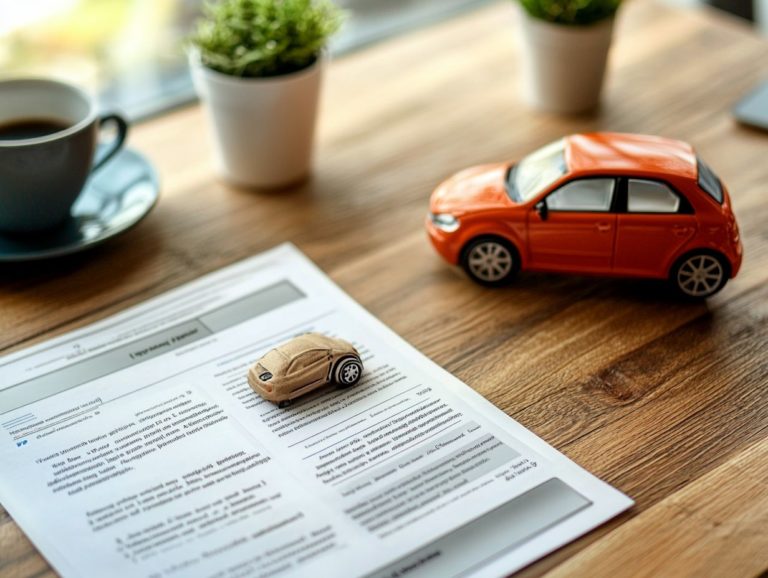How to Spot Overpriced Cars: A Comparison Guide
Buying a car can be quite the adventure, yet it often feels overwhelming, especially when it comes to understanding pricing. With many factors influencing costs, it s crucial to know what to focus on to avoid spending more than necessary.
This guide explores the details of car pricing, helping you identify the elements that affect values and determine fair market prices. It highlights the red flags that signal overpriced vehicles and equips you with effective negotiation strategies, ensuring you secure the best deal.
It also explores other options for finding affordable cars, simplifying your search and enhancing your chances of success.
Contents
- Key Takeaways:
- Understanding Car Pricing
- How to Determine Fair Market Value
- Signs of an Overpriced Car
- Tips for Negotiating a Lower Price
- Alternative Options for Finding Affordable Cars
- Frequently Asked Questions
- What is the importance of knowing how to spot overpriced cars?
- What are the common signs of an overpriced car?
- How can I use reference data to compare car prices?
- What should I look for during a test drive to determine if a car is overpriced?
- Is it worth paying more for a car with lower mileage?
- What should I do if I suspect a car is overpriced?
Key Takeaways:
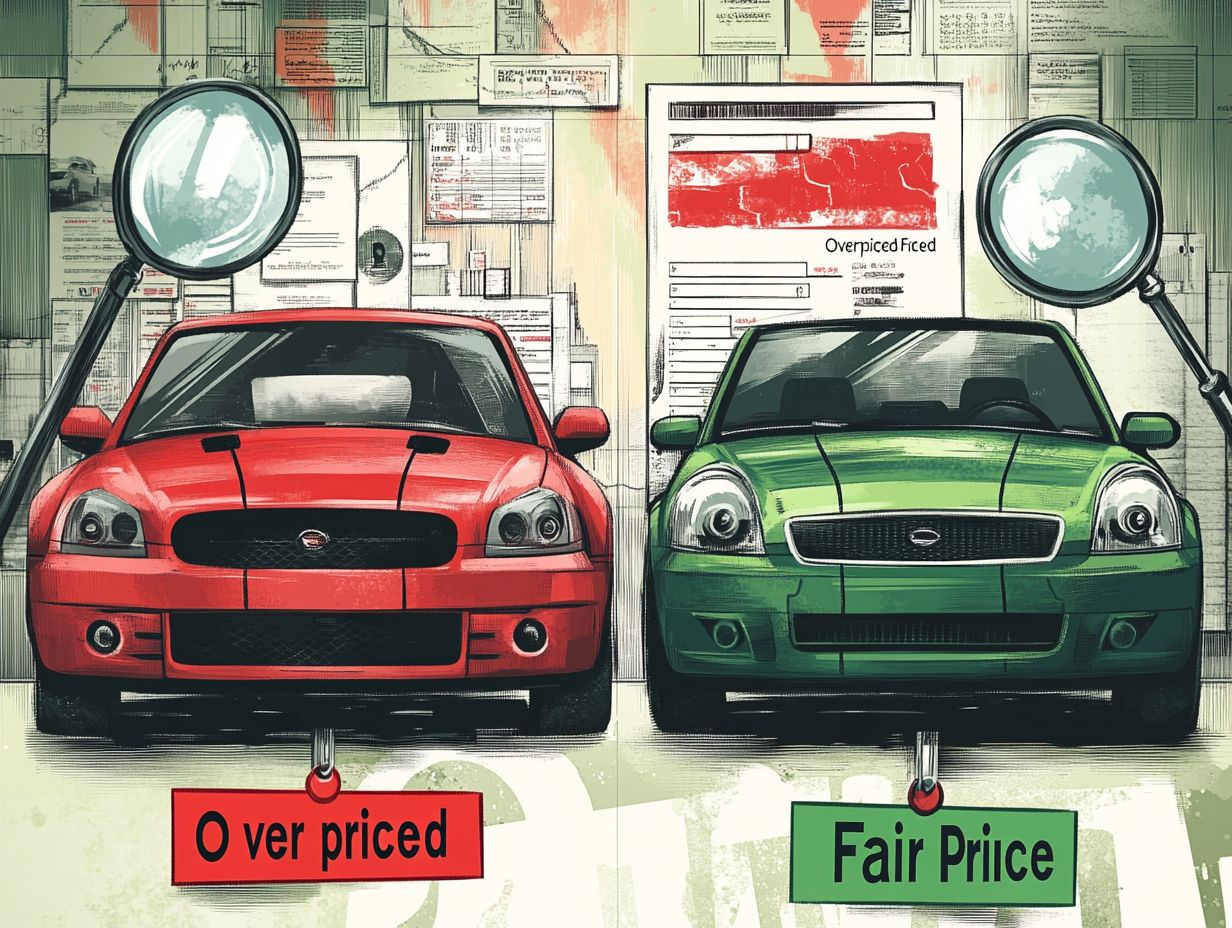
- Understand the factors that influence car prices, such as brand, model, and condition.
- Research fair market value by comparing prices of similar cars to ensure you are not overpaying.
- Be aware of red flags to spot an overpriced car, such as high mileage, hidden fees, and lack of maintenance records.
Understanding Car Pricing
Understanding car pricing is essential for you as a car buyer navigating the complex landscape of the automobile market. With market prices constantly changing, it s important to consider factors like the condition of the used vehicle, its mileage, and the average transaction price for similar models.
This knowledge helps you make informed decisions, protecting you from the risk of purchasing an overpriced lemon. By grasping the principles of car valuation and understanding the importance of saving money, you can effectively evaluate your options and engage in meaningful price negotiations.
Factors that Affect Car Prices
Many factors significantly influence car prices, including the asking price set by the seller and the overall condition of the vehicle, which includes mechanical issues, cosmetic damage, and the odometer reading reflecting wear and tear.
When evaluating the cost of a used vehicle, consider elements like worn tires, which can impact both safety and performance. Poor tire condition might lead to unexpected maintenance expenses that sellers often overlook when determining their price.
Trade-ins also play a crucial role in shaping the asking price. Dealers typically offer lower values for vehicles they plan to resell, which can significantly affect market dynamics.
By understanding these elements, you can make more informed purchasing decisions, ultimately securing better value for yourself in this competitive market.
How to Determine Fair Market Value
Determining the fair market value of a used car is vital for making an informed purchase. This process requires thorough research across multiple reputable sources, such as Consumer Reports, Edmunds, KBB, and NADA.
These platforms provide invaluable pricing methodologies and insights into market trends, giving you the knowledge needed to make a smart decision.
Researching Prices for Similar Cars
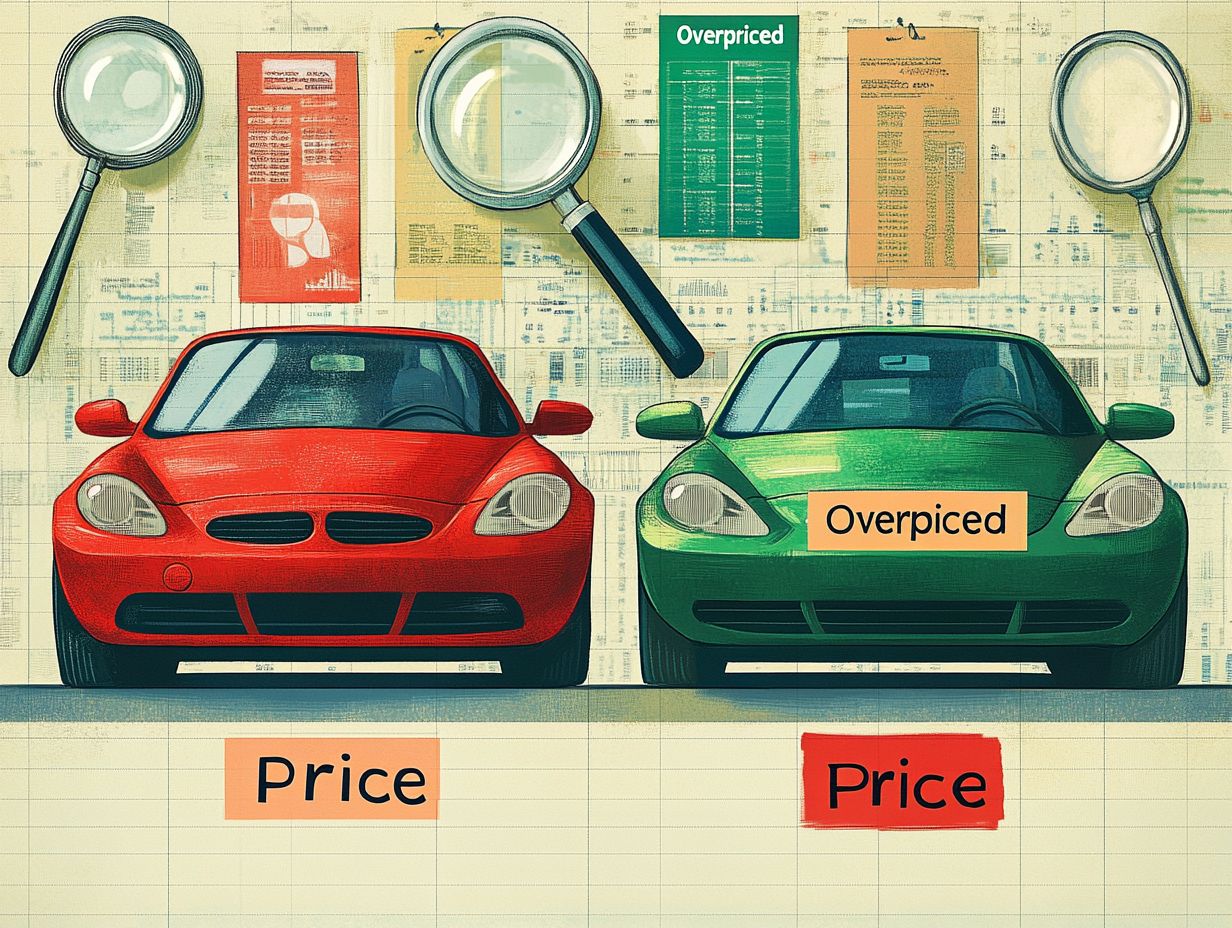
Researching prices for similar cars is essential for understanding the market landscape and ensuring you negotiate the best deal. This involves analyzing mileage comparisons and evaluating dealer pricing against private sellers.
By delving deeper into this process, you ll greatly enhance your chances of securing a competitive offer. Visiting multiple dealerships allows you to gather firsthand insights into price variations and promotional offers that might not be widely advertised. Checking online classified ads expands your options, enabling effective price comparisons and access to private sellers who may be open to negotiations.
Utilizing automotive inventory databases can reveal pricing trends that are crucial for identifying potential discounts and aligning them with fair market values. This comprehensive approach not only enables you to make informed decisions but also streamlines your negotiation process, putting you in the driver s seat.
Start your car buying journey today and make the most of this guide!
Signs of an Overpriced Car
Recognizing the signs of an overpriced car, often referred to as an “overpriced lemon,” is crucial for any discerning buyer. Having access to the essential guide to comparing car models can further enhance this awareness and help you sidestep potential pitfalls.
Be sure to delve into the vehicle history for any major accidents and meticulously examine the inspection report. Pay close attention to critical safety features.
Red Flags to Look Out For
When you’re in the market for a used car, several red flags should definitely catch your attention. Keep an eye out for suspiciously low odometer readings, visible mechanical issues, and signs of cosmetic damage that might conceal deeper, underlying problems.
These indicators can hint at dishonest behavior by previous owners or even a sketchy vehicle history. For instance, a low odometer reading might initially appear to be a fantastic deal, suggesting a car with fewer miles. However, it could also indicate that the meter has been tampered with, which might mean potential wear and tear that you, as the buyer, could easily overlook.
Visible mechanical issues like leaks or strange noises signal neglected routine maintenance. Be on the lookout for cosmetic damage such as dents or rust, as these could point to past accidents that haven t been fully disclosed.
Recognizing these red flags is essential; ignoring them could result in a significant drop in the car’s value and ultimately diminish your overall satisfaction with the purchase.
Tips for Negotiating a Lower Price
Negotiating a lower price when purchasing a used car is truly an art form. Understanding how to engage effectively with the seller is essential for securing the best deal. This is especially true when you’re making a cash payment that can lead to significant financial savings.
Mastering this skill not only enhances your buying experience but also ensures you’re making a smart investment.
Strategies for Getting a Better Deal
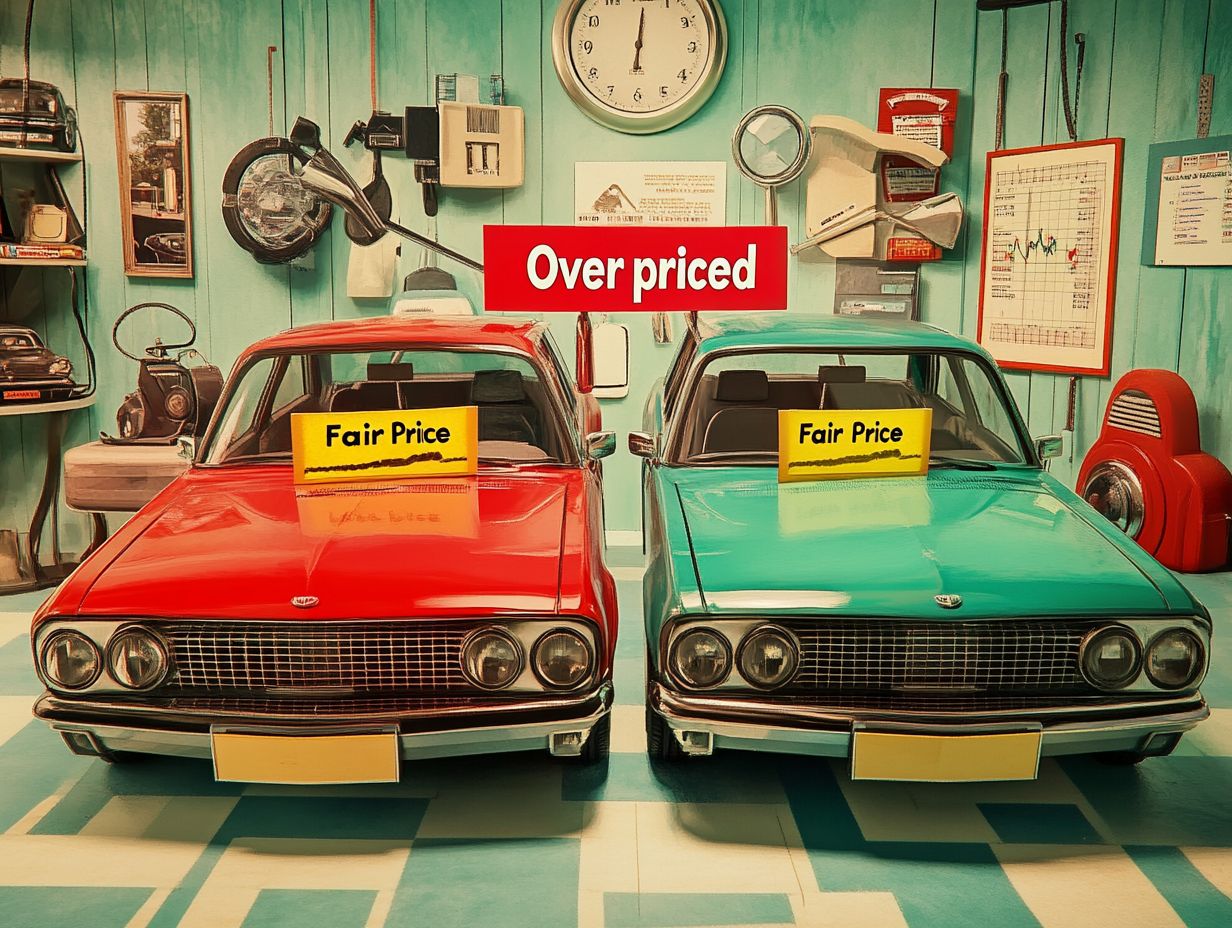
Implementing proven strategies for securing a better deal can significantly enhance your price negotiation process. It s essential to keep a sharp focus on your budget and remain alert to discount opportunities when engaging with dealer pricing.
Understanding the nuances of timing your purchase can lead to more favorable outcomes. Many buyers overlook the advantages of shopping during off-peak seasons or taking advantage of manufacturer incentives, which can work to your benefit.
Being astute about dealer pricing systems enables you to spot when a vehicle is priced above market value. Additionally, effectively utilizing trade-ins can boost your negotiation leverage, allowing you to offset some of the costs.
Staying informed about current market conditions and fuel prices, while adopting an assertive negotiation stance, positions you to secure the most favorable deals. Don t miss out on the chance to negotiate a fantastic deal! After all, knowledge is power in any transaction.
Alternative Options for Finding Affordable Cars
Exploring alternative avenues for discovering affordable cars can unlock a treasure trove of opportunities for you as a buyer. By leveraging automotive inventory databases (online listings of available cars) and utilizing specialized online platforms dedicated to second-hand vehicle listings, you can significantly broaden your search and enhance your purchasing experience.
In summary, keep an eye out for red flags, master the art of negotiation, and explore alternative options to ensure you find the best car at the best price!
Exploring Other Sources and Methods
Explore alternative sources to find a used car. Traditional dealerships aren’t your only option. Online platforms and community listings can offer competitive prices.
Social media groups are a goldmine for local listings and recommendations from fellow buyers. These platforms often host community exchanges, allowing sellers to post vehicles at reasonable prices. You can negotiate directly, without the pressure of a dealership environment.
Local classifieds are a fantastic way to snag great deals right in your neighborhood. They facilitate smooth transactions with nearby sellers and help you sidestep pesky shipping costs.
Auction sites present an exhilarating option for savvy buyers. They frequently feature vehicles priced well below market value if you know how auctions work.
By tapping into these diverse sources, you can uncover incredible deals that you might not typically find on conventional lots.
Frequently Asked Questions
What is the importance of knowing how to spot overpriced cars?
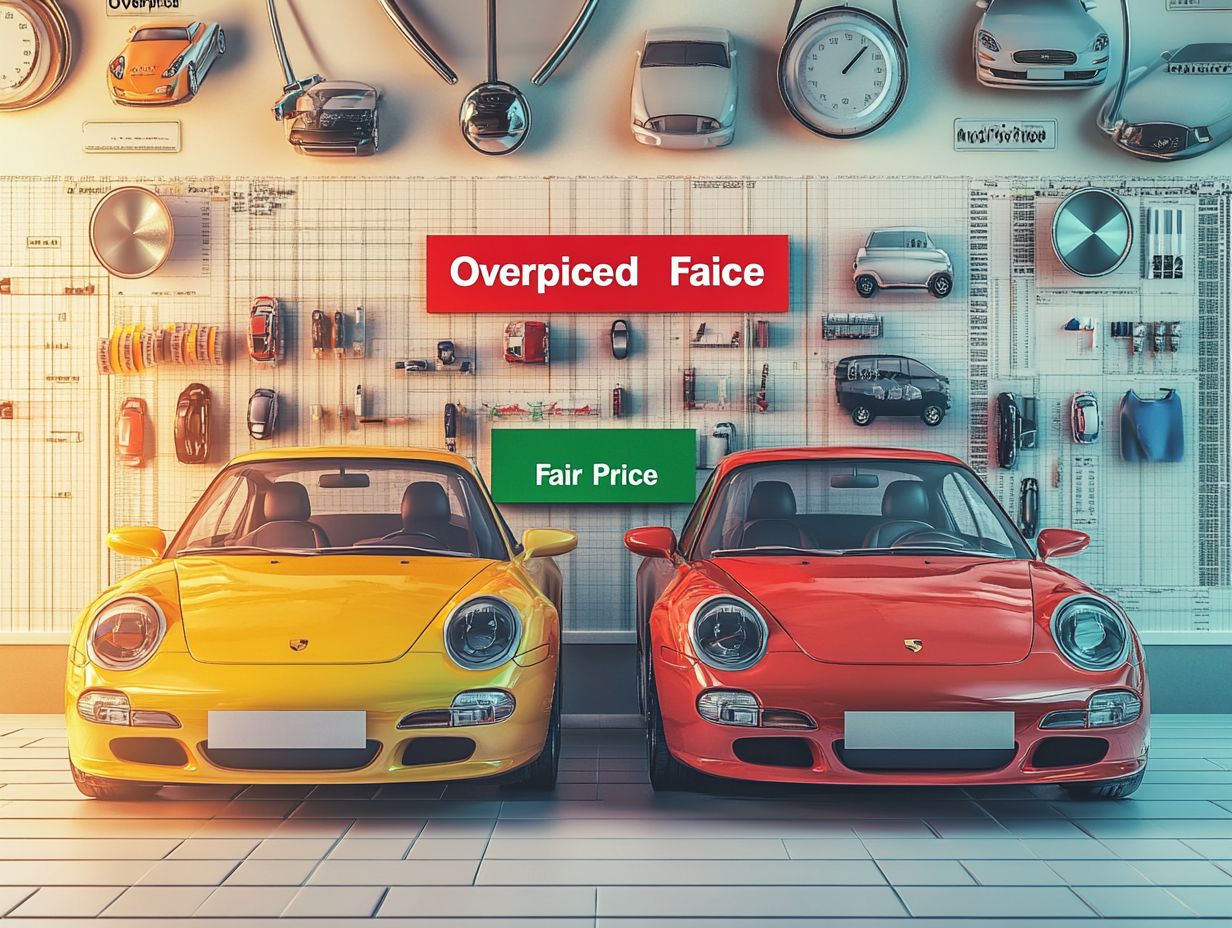
Knowing how to spot overpriced cars can save you thousands of dollars and helps ensure you make informed decisions. Learning how to use price comparison tools for cars also prevents you from getting scammed or buying a car that’s not worth its price.
What are the common signs of an overpriced car?
Common signs include a high listing price compared to the market value, excessive wear and tear, and a lack of maintenance records.
How can I use reference data to compare car prices?
You can use reference data like Kelley Blue Book or Edmunds. Enter the make, model, year, and mileage of the car to get an idea of its market value and see if it s overpriced.
What should I look for during a test drive to determine if a car is overpriced?
During a test drive, pay attention to any unusual noises, vibrations, or smells. These could indicate underlying issues that might make the car overpriced.
Is it worth paying more for a car with lower mileage?
Not necessarily. While lower mileage may seem appealing, consider the overall condition of the vehicle. A well-maintained car with slightly higher mileage could be a better value than a neglected car with low mileage.
What should I do if I suspect a car is overpriced?
If you think a car is overpriced, research it and gather proof. You can negotiate with the seller using reference data to show the car’s market value. If the seller won’t lower the price, it s best to walk away and find a better deal elsewhere.
Start your search today and find your dream car at the best price!





